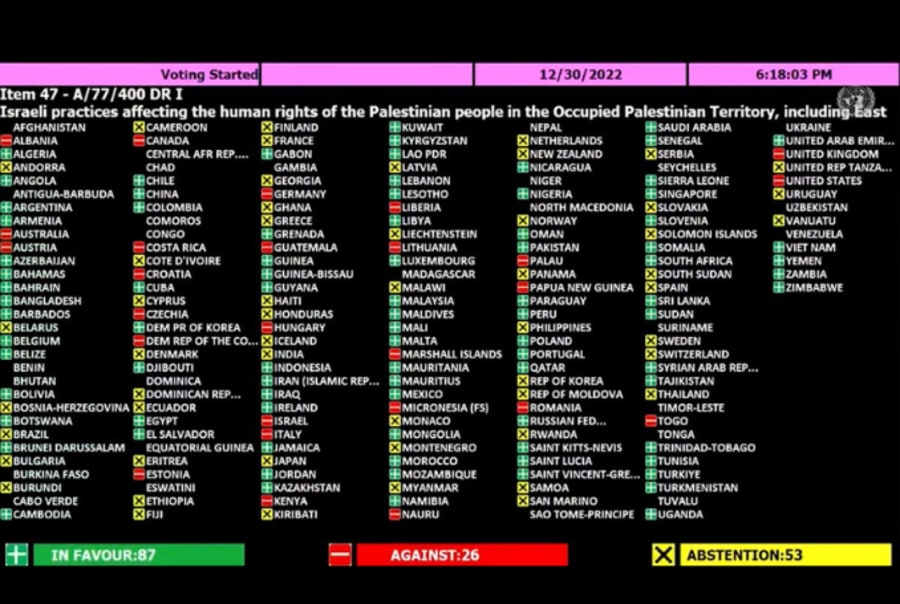Netanyahu says ‘disgraceful’ UN vote ‘will not obligate’ Israel
Resolution calls on international court to render opinion on Israel’s “prolonged occupation, settlement and annexation of Palestinian territory”

Israeli Prime Minister Benjamin Netanyahu said Saturday evening that a “disgraceful” United Nations resolution calling on the International Court of Justice in The Hague to weigh in on the legal consequences of the Israeli presence in Judea and Samaria “will not obligate the government of Israel.”
“The Jewish people are not occupying its land and is not occupying its eternal capital, Jerusalem. No U.N. resolution can distort this historical truth,” the prime minister said.
The resolution – “Israeli practices and settlement activities affecting the rights of the Palestinian people and other Arabs of the occupied territories” – passed Friday afternoon. Eighty-seven assembly members voted in favor of the resolution, 26 against it and 53 abstained.
The resolution calls on the ICJ to “render urgently an advisory opinion” on Israel’s “prolonged occupation, settlement and annexation of Palestinian territory.” It also calls on the court to recommend steps against Israel for “altering the demographic composition, character and status of the Holy City of Jerusalem” and adopting “discriminatory legislation and measures” in the West Bank.
Israel gained Judea and Samaria and East Jerusalem from the Jordanians during the defensive Six-Day War in 1967 but has never applied sovereignty to the territory. Today, according to the Yesha Council, more than 460,000 Jews are living in Judea and Samaria.
The rulings of the ICJ are binding. However, the court – a separate body from the International Criminal Court in the Hague – has no power to enforce them.
The votes against the resolution and the abstentions totaled 79 countries, which Netanyahu noted was a smaller margin of support for such anti-Israel measures than in the past. He said in his statement that 11 countries changed how they planned to vote after outreach from the Jewish state.
All of the Arab countries that share diplomatic ties with Israel voted in support of the resolution, including the United Arab Emirates, Bahrain, Morocco, Jordan and Egypt. Some of the members of the 193-nation assembly did not vote at all, including Ukraine.
The prime minister’s office said that Netanyahu spoke with Ukrainian President Volodymyr Zelenskyy following the vote. There was no comment on the diplomatic discussions that were held.
Israeli Ambassador to the United Nations Gilad Erdan reacted to the vote on Friday, calling it “outrageous” and “a moral stain on the U.N.”
Erdan was not present for the vote because it took place after sundown on Friday and the Sabbath had already begun. Instead, the United States cast Israel’s vote against the resolution on its behalf.
“The decision to hold a vote that deals with Israel on Shabbat is another example of the moral decay of the UN, which prevents Israel’s position from being heard in a vote whose results are predetermined,” he said. “Instead of pushing the Palestinians to change, the UN is doing the opposite: helping them to harm the only vibrant democracy in the Middle East… We will not take part in this disgraceful show of lies.”
The vote came only a day after Netanyahu swore in his new government, considered the most right-wing and religious government ever to rule in the State of Israel.
Although Netanyahu has not given any indication that he will imminently annex any parts of the West Bank, members of his coalition have listed among their top priorities the expansion of Israel’s presence in the territories. His coalition deal with the Religious Zionism party includes a commitment to legalize dozens of unauthorized settlements and to heavily invest in improving roads and public transportation options in the area.
There is also a commitment to annex the West Bank to Israel, although the wording is vague.
But because Netanyahu plans to push for a normalization agreement with Saudi Arabia, this will likely delay any plans to annex the territory.
In his first major statement as the newly appointed foreign minister, Eli Cohen on Saturday night called the U.N. vote “an anti-Israeli decision that lends support to terrorist organizations and the anti-Semitic BDS movement, contravening the agreed-upon principles of the U.N. itself.”
“This initiative represents another error made by the Palestinian leadership, which has been supporting and inciting terrorism for years and leading its people in such a manner that harms the Palestinians themselves, as well as the possibility of resolving the conflict,” Cohen continued. “Instead of working for the benefit of the Palestinian people and fighting terrorism, the Palestinian leadership promotes futile efforts to harm Israel.”
Like Netanyahu, he said the decision would not change the situation on the ground nor stop Israel from continuing to fight terrorism, protect its citizens and advance its interests.
“Israel expects the U.N. to reject the Palestinians’ attempts to politicize U.N. institutions, an act which harms the organization’s international standing and integrity,” he said.
Another coalition member, Ohad Tal of the Religious Zionism party, tweeted, “U.N. be advised: Judea and Samaria are an inseparable part of our current and historic homeland for the past 4,000 years. It is written all over the Bible, that little minor book, and it's not going to change soon.”
Professor Gerald Steinberg, president of the Jerusalem-based NGO Monitor said the vote “represents another stage in the political war against Israel, based on the cynical use of U.N. and international legal bodies. Behind those stages, there is a network of European-funded NGOs who are driving the absurd campaign to isolate Israel as South Africa was under apartheid, and eventually seek the prosecution of Israeli officials at the ICC."
The Palestinians celebrated the vote.
“This vote is a testament to the support of the entire world for our people and their indisputable historical rights,” a statement from the office of Palestinian Authority Chairman Mahmoud Abbas said. “President Mahmoud Abbas thanks all the countries that stood by the Palestinian and their rights, and all the parties that worked to bring about this decision.”
.jpg)
Maayan Hoffman is a veteran American-Israeli journalist and strategic communications consultant. She is Deputy CEO - Strategy & Innovation for the Jerusalem Post, where she also served as news editor, head of strategy and senior health analyst.













